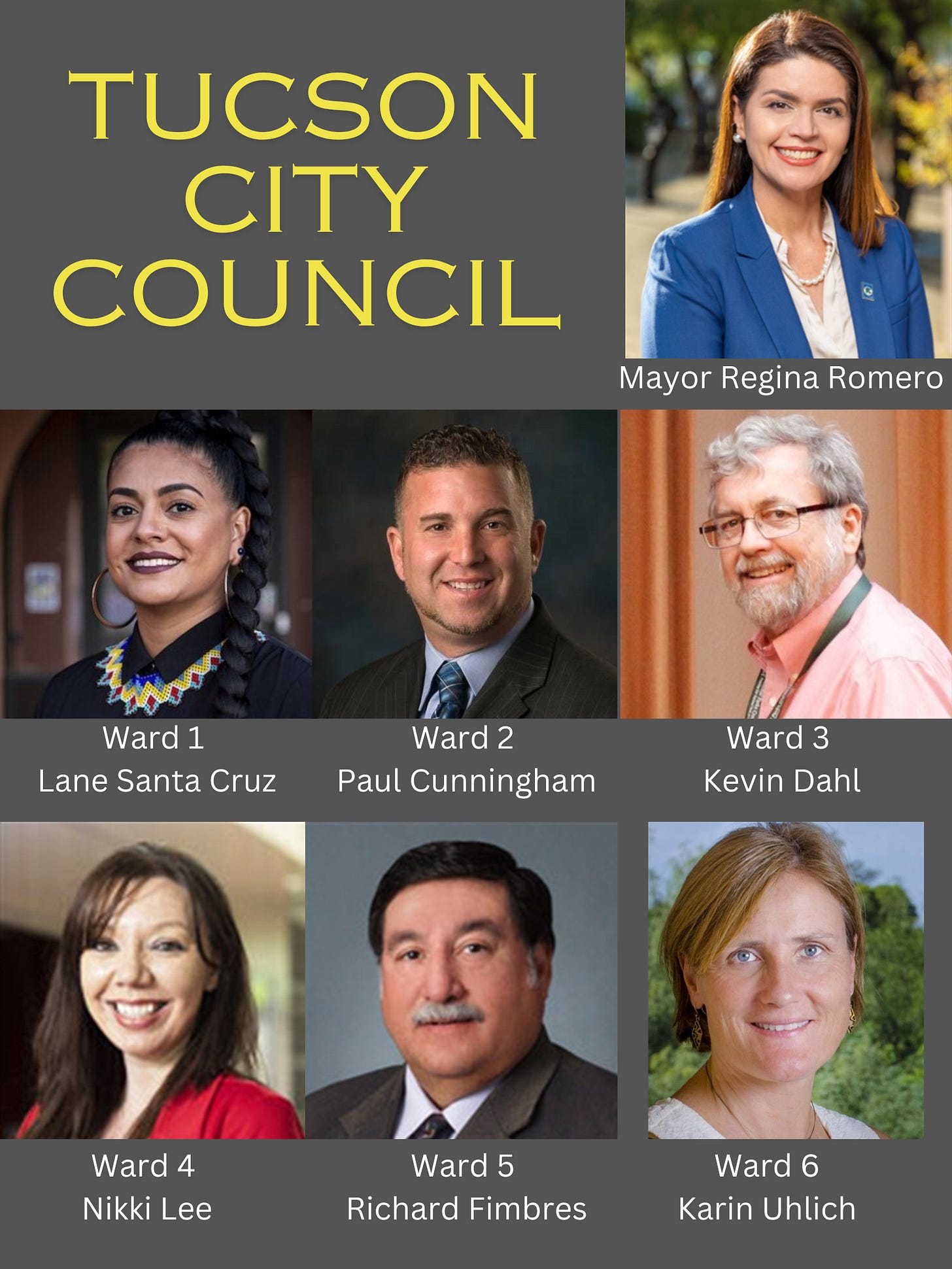The Daily Agenda: Budgets, bonds, Bowers, and more
Tucson may tweak its towing ordinance ... Cell tower at TUSD school causes concerns ... Hobbs won't intervene on I-11.
This week, we’re looking at recent and upcoming meetings of elected officials in Tucson, Pima County, South Tucson, and the Tucson Unified School District.
The public can weigh in on the City of Tucson budget tomorrow. The Tucson City Council set their spending cap last month at $2.4 billion and now they’re voting on the final budget. They’ll hold a public hearing during their 5:30 p.m. meeting tomorrow at City Hall, or you can watch it on the city’s YouTube channel.
Tucson City Councilman Kevin Dahl wants to tweak the city’s towing ordinance. Dahl led the charge last November to crack down on predatory towers and rewrite the ordinance. One of the complaints from city residents was that companies would tow their cars and then not be available to release them, but still charge hefty fees for storage.
After the council approved the new ordinance, Dahl and the city attorney met with three towing companies who objected to including the first 72 hours of storage in the base towing fee. The tweaks the council will consider tomorrow would remove the 72-hour requirement and only include the first day of storage. But after the first day, towing companies couldn’t charge for storage unless they’re available to release the vehicle during defined business hours.
In the interest of more “mega projects,” city officials want to rezone about 300 acres and add it to an industrial campus near Houghton Road and Interstate 10. The Arizona Commerce Authority and national site selection firms are eyeing that land for development and city officials think it could lead to 2,000 new jobs.
The area is in the “Southlands” and could add 1 million square feet of industrial or manufacturing space. City officials say new tax revenues could amount to $1.6 million for Prop 411 for neighborhood streets, $1.2 million in impact fees, and $1.2 million in annual public utility taxes.
After concerns arose about Tucson magistrates violating the constitutional rights of defendants, Pima County officials are ending their contract with Tucson City Court for initial appearances, where a judge sets release conditions and bail. The arrangement has been in place for nearly 20 years and will end next month. It came under scrutiny in recent years due to a “a concern about how City Court magistrates were handling IAs and imposing bail amounts,” County Administrator Jan Lesher wrote in a May 29 memo.
The memo doesn’t give a specific example, but there was a stink last year after a review commission said Presiding Magistrate Antonio Riojas, Jr. shouldn’t be reappointed. The commission said he didn’t provide legal counsel for some DUI defendants, which violated their constitutional rights. Riojas said it was due to lack of staffing at the public defenders office.
County staff broke down how they plan to spend $21 million in federal dollars to support asylum seekers this year, in response to a question from Supervisor Steve Christy at the May 21 meeting. The county submitted a budget to federal officials that shows $11 million for shelter, $4.8 million for labor, $2.9 million for transportation, and $2.4 million for food. The supervisors are set to discuss future funding opportunities at their meeting tomorrow.
Speaking of those funds, there apparently were some procurement shenanigans at Catholic Community Services, one of the lead local agencies in supporting asylum seekers. Two employees had a conflict of interest in a program that overcharged for services. They were fired, the contract was cancelled, and Lesher asked the county attorney’s civil division to look into it.
South Tucson voters are going to decide whether to pick up the tab for the city’s long-underfunded fire department. After months of trying to find a way to make up for a funding shortfall, the South Tucson City Council decided at their May 21 meeting to hold a bond election in November. The council formed a citizen advisory committee to look at their options and the committee recommended the city hold a bond election, which would be funded by property taxes. Many residents have come to council meetings in support of the fire department and have stressed the importance of having their own fire department, separate from the City of Tucson.
We’re trying to get to 900 paid subscriptions by our one-year mark on July 4. We’re making good headway! But we’re not quite there yet. Upgrade to a paid subscription and help us get there!
Public criticism is far from over for Brian Bowers, the owner of apartment complexes in South Tucson who was recently sued by the city, which claimed the living conditions in his apartments were awful. A few weeks after Council member Roxanna Valenzuela called for tenants to picket Bowers’ home, five tenants took him to task at call-to-the-public at the May 21 meeting, with one calling him a “glorified thug” who used his power to take advantage of a vulnerable community.
“It’s very emotional and tiring because the only thing I want to do is pay my rent, and live,” said Ashley Clark, a tenant at the Spanish Trails apartment complex. “It’s impossible to do so, dealing with this guy. You can’t talk to him, you can’t expect him to do what he’s promising in the lease.”
Over at the Tucson Unified School District, a handful of community members raised concerns during the governing board’s most recent meeting about the proposed placement of a 5G cell phone tower at Collier Elementary School. Attendees told board members they’re worried about the uncertainty surrounding health risks associated with the tower and criticized district officials for what they called a lack of outreach and communication.
This isn’t the first time TUSD tried to place a cell tower on Collier’s campus. Back in 2015, then-Superintendent H.T. Sanchez was forced to scrap a similar plan after “droves” of parents expressed similar concerns and threatened to remove their children from the northeast-side school, the Arizona Daily Star reported at the time. It’s unclear if the issue will be discussed at a future meeting, but the Tucson Agenda is looking into the situation.
Staying out of it: Gov. Katie Hobbs told Capitol Media Services’ Howard Fischer that she won’t be intervening in the controversy surrounding Interstate 11, which could put a new interstate next to Tucson Mountain Park and through a wildlife migration corridor. Hobbs said she’s not surprised that environmental groups have sued the state over plans for Interstate 11, but said it’s a matter of balancing progress and sustainability and the highway is an important part of a new link through the state between Mexico and Canada.
There’s always next year: The University of Arizona baseball team’s hopes for a trip to the NCAA World Series were dashed yesterday, with a 7-0 loss to Dallas Baptist in an elimination game at Hi Corbett Field during the regional tournament, KVOA’s Jenna Fink reports. The Wildcats have made the tournament under all three seasons of Coach Chip Hale’s tenure, but have gone 0-2 in the last two seasons.
Beat the heat: It’s hot out there and it’s only going to get worse (don’t look at Thursday’s forecast if you haven’t already,) and while summer doesn't officially start for a few more weeks, the Arizona Daily Star’s Cathalena Burch and This is Tucson’s Gloria Knott have compiled a huge list of public pools, splash pads, resorts and hotels in Tucson, Oro Valley and Marana. The City of Tucson has opened 20 of its pools through July 31 and many local resorts offer day passes and summer specials for residents.
Big bucks in play: Arizona Public Media’s Zac Ziegler digs into federal election spending in one of Arizona’s Senate races in the latest episode of The Buzz. Ziegler reports on spending by candidates Kari Lake, Ruben Gallego and Mark Lamb, which show that most of their money has been spent on physical media, including mailers and signs, followed closely by television, radio and print advertisements. Lake has spent the most on physical media, reporting more than $746,000 in expenditures. Over in the world of television and radio ads, Gallego reported spending more than $1.5 million on what his campaign called “paid media” and refers to those television, radio and print ads.
Lots to unpack: Speaking of Lamb, the Arizona Luminaria’s John Washington attended a Tucson meet-and-greet with the Pinal County Sheriff and U.S. Senate candidate last week, during which Lamb called Donald Trump’s conviction on federal charges a “travesty of justice” and said he’d shut down the border. In an interview with Washington after the event, Lamb claimed “way more” than 10,000 recent border crossers had been sold into slavery in the U.S. and that upwards of 100,000 children had been trafficked.
Talking cash: Curt was a guest host on Friday’s Bill Buckmaster Show and spent time chatting with Tucson City Manager Tim Thomure. The trio discussed the city’s water supply, what’s next for the RTA, reimagining public safety, climate change and the challenges facing the city during the next fiscal year, which kicks off in just a few weeks. You can listen to that interview here or read a summary of it here, courtesy of Three Sonorans.
$30,000: The annual funds Pima County officials will vote on Tuesday to provide to Humane Borders, a humanitarian group that maintains water stations for migrants in the desert. The desert can be deadly for migrants, particularly as the summer heat arrives. Just last year, the remains of 197 migrants were found in Southern Arizona.











